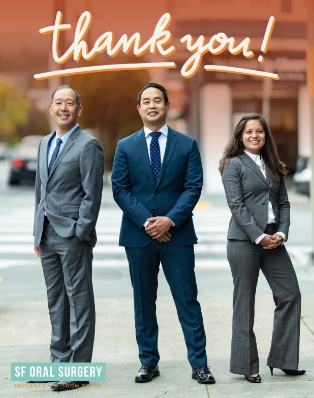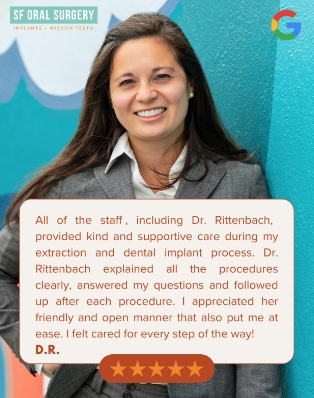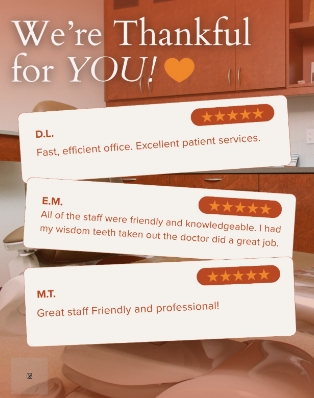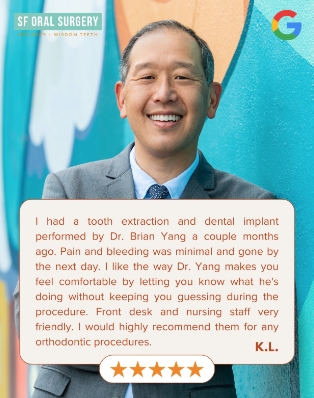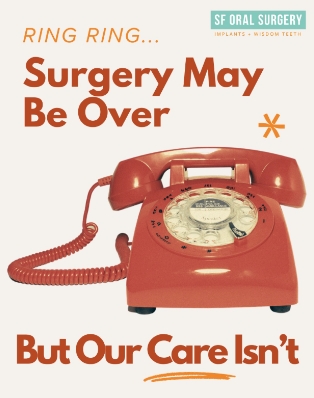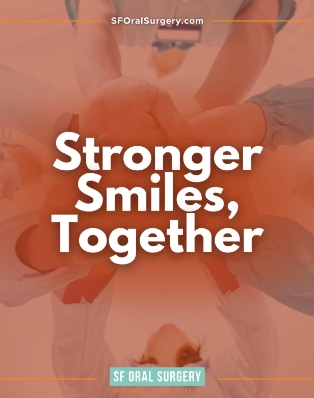Wisdom teeth removal is a necessary procedure to protect the oral health of most patients. Wisdom teeth, or third molars, often enter a smile that simply does not have room for them. SF Oral Surgery performs wisdom teeth removal in San Francisco to promote your maximum comfort.
When Do Wisdom Teeth Grow In?
Most patients will have all of their adult teeth by the time they’re 13 years old, with the wisdom teeth being the last to erupt. Your wisdom teeth usually begin to erupt when you’re between 18 to 24 years old. Although patients of all ages come to SF Oral Surgery for wisdom tooth removal, the sooner you come in for treatment, the less risk you’ll develop more severe symptoms.

Symptoms That May Lead to Wisdom Teeth Removal
Because wisdom teeth are the last to erupt, most problems related to wisdom teeth involve teeth crowding in your mouth. The symptoms tied to this can vary from mild to very severe. While these are not the only signs that you need wisdom teeth removal, they are the most definitive symptoms that your wisdom teeth should be removed in the near future.
- Swelling. Your gums, jaw, and cheeks are all prone to swelling as your wisdom teeth come in. Wisdom teeth removal can help prevent or reduce this swelling.
- Pain. Your jaw and the very back of your gums, where the wisdom teeth will erupt, often become painful.
- Bad taste. You may taste something bad even though you haven’t eaten anything recently because of the decay of the wisdom teeth. Wisdom teeth removal can reduce and eliminate this perpetual bad taste.
- Jaw barely opens. More severe cases of swelling create difficulty opening your jaw fully and cause pain when chewing. Wisdom teeth removal can restore your ability to eat and speak comfortably.
Frequently Asked Wisdom Teeth Removal Questions
Should You Have Wisdom Teeth Removal?
Wisdom teeth removal is a common procedure, with about 70% of the population requiring this procedure because their mouths cannot accommodate more than 28 teeth. However, careful assessment by an oral surgeon is required to determine if the wisdom teeth will affect the rest of your teeth or align with your smile. Signs that indicate wisdom teeth removal is necessary include:
- Impaction: When your wisdom teeth do not erupt and remain trapped beneath the gum and bone, they are impacted. Impacted teeth, especially when they are third molars, can lead to severe oral health problems.
- Positioning: Wisdom teeth do not always grow in straight. If your teeth erupt sideways, they may then affect the alignment of your bite and cause other symptoms, such as pain and swelling. Wisdom teeth removal would be required to eliminate these symptoms.
- Partial Eruption: Occurs when your wisdom teeth do not have the space to fully emerge. This makes you more susceptible to a type of gum infection called pericoronitis, which can cause muscle spasms in your jaw and the lymph nodes under your chin to swell.
While these problems all require wisdom teeth removal, each condition may cause slightly different symptoms and require a different approach to removal surgery.
A Legacy of Care Since 1979
Consequences of Avoiding Wisdom Teeth Removal
Your wisdom teeth, or third molars, are a completely unnecessary byproduct of evolution. While this adaptation was helpful for our ancestors whose teeth suffered from a lack of dental hygiene, we no longer need these extra teeth and they often need to be removed. Most San Francisco patients only have room in their mouth for 28 teeth. Many patients visit SF Oral Surgery for wisdom teeth removal because some or all wisdom teeth have begun to erupt and cause such problems as:
Bite misalignment
Headaches
Damage to bone and adjacent teeth
Bacterial infection
Wisdom Teeth Removal Examination
To pinpoint the exact position of your wisdom teeth, Dr. Michael Chan, Dr. Kirsten Rittenbach, and Dr. Brian Yang will evaluate X-rays of your mouth to determine whether wisdom teeth removal is necessary. Based on this and a comprehensive oral examination, your oral surgeon will be able to accurately assess the right approach for surgery.
The Wisdom Teeth Removal Process
If you do require wisdom teeth removal, your oral surgeon will first administer anesthesia to make you comfortable. SF Oral Surgery recommends that you weigh the options for anesthesia carefully before choosing one and the options will be discussed in more detail during your consultation.
After receiving the anesthesia of your choice and recommended by your doctor, one of the oral surgeons at SF Oral Surgery will:
- Make an incision into your gum line or around the teeth.
- Remove your wisdom teeth.
- Suture the incision with dissolvable stitches.
You will have time to rest after wisdom teeth removal until you are ready to go home with the help of a friend or relative.
Read Our Reviews
Read More ReviewsThey were just so competent they made me feel like they know what their doing and the fact that my daughter also felt comfortable with Dr. Chan gave me the security I needed. They were so hospitable in a way it was almost as if I walked into a 5-star hotel instead of an oral surgery office. JAIME
Recovering from Wisdom Teeth Removal
Before you leave the office, you will receive the following for after surgery:
- Prescription for pain medication
- Prescription for anti-inflammatories
- Post-operative instructions
You will need to take at least a few days to rest after your surgery and limit your diet to liquids immediately after surgery. As you recover, you should incorporate soft, solid foods to give you the energy to heal. You will have a follow-up appointment approximately one week after surgery to check on your recovery.
A Legacy of Care, Centered on You
At SF Oral Surgery, wisdom teeth removal is more than just a routine procedure, it’s part of our commitment to comprehensive, patient-centered care. Our board-certified oral surgeons combine advanced surgical techniques with compassionate support to ensure your comfort, safety, and long-term oral health. From initial consultation through recovery, every step is designed around you.
To schedule a visit in San Francisco for wisdom teeth removal, contact SF Oral Surgery.
Our Procedures:
Request A Consultation
Get To Know Your Team | Follow Us On Instagram
